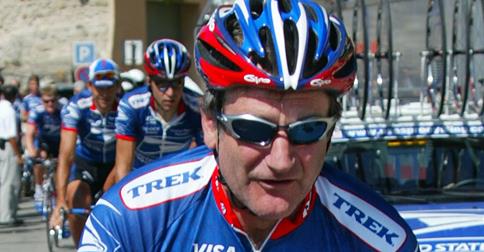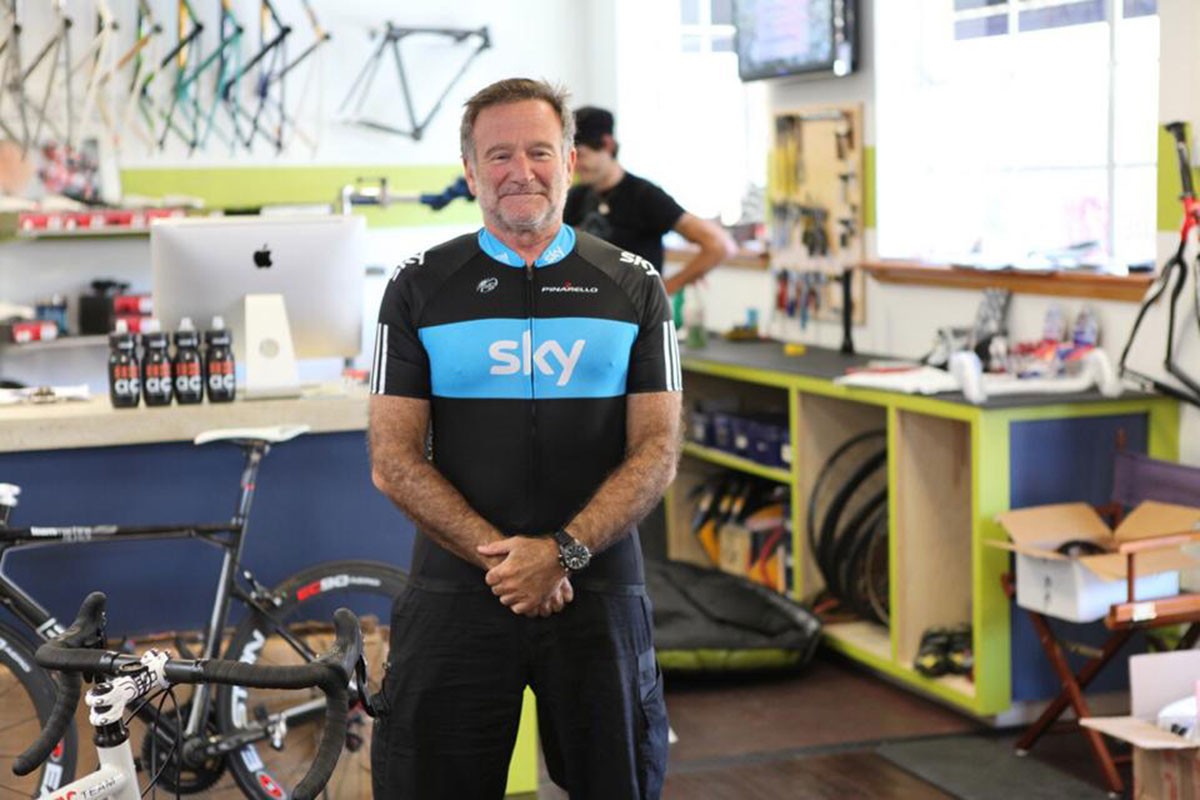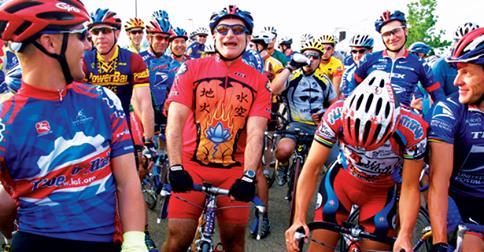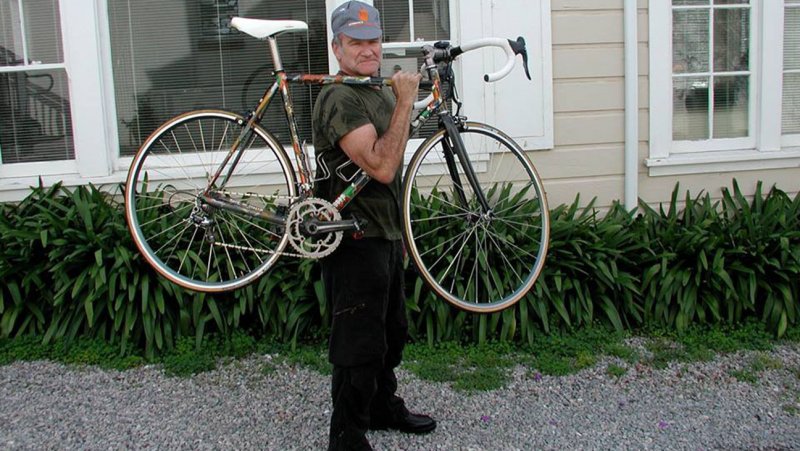
Here is a fascinating, and extensive interview with the late comedian and actor Robin Williams about his love affair with everything cycling related. It’s almost unbearably tragic that a man as valuable to the human race as Robin fell to such a low point that he felt the need to take his own life. I am a big believer in the power of humor to heal. I myself went through a low-point years ago that was successfully addressed by watching Charlie Chaplin movies! I wish Robin could have found the healing in his own movies that so many others did.
This interview was conducted in 2003 by cycling impresario Michael Aisner. A terrific man that I’ve had the privilege of spending a little bit of time with. So glad that I found this and hope that you enjoy reading it also.
The rest of this is from Michael Aisner and the interview that he conducted:
Robin Williams loved lube.
He loved chain lube and rear derailleurs, lactic acid and bike geometry. Just mention the bicycle, and he melted, his fingers tracing his oration of the bicycle as art, as utility and culture. He worshiped bicycles. This was not lip-service from a Hollywood star. He owned 60 bikes. He made sure his movie contracts allowed for riding time, although studio heads hated their expensive, irreplaceable star riding a bike in the middle of a shoot. He visited the Tour de France whenever there was a crack in his busy schedule.
Robin Williams was not just a cyclist, but also a well-versed aficionado of the sport of bike racing. First off was the discovery that, for him, it all started at the Coors Classic, the race I had promoted, and that revelation was an initial bonding that had us announcing bike races together, meeting at the Tour, and hosting a Davis Phinney Foundation fundraiser. The friendship remained through the years.
I should note that, at the time, he was absolutely smitten with Lance Armstrong and the story Armstrong had created around his Tour victories, which have subsequently been disqualified. Robin was devastated after Armstrong’s confession, and was very quiet about Armstrong after that. He felt deeply double-crossed, having been so vocal about supporting Armstrong through all the doping allegations. He felt he had lent his entire weight and reputation to the Armstrong defense, making very public comments on Armstrong’s defense during media and public appearances. He was disappointed in Armstrong to the core, as an athlete, as a person, and as a friend.
But, above all else, Robin Williams was was a lover of the bicycle. He was a super fan — our super fan. And he was ours to have lost.
Q: I’m guessing your first bike was not a $15,000 titanium Serotta?
RW: After my training wheels, my first real bike was a Schwinn, and my first time out, I rode down a hill, didn’t know how to stop, and ran right into a tree. So, that was a nice experience … like realizing, oh, there are brakes! Chicago was the place where I really started to ride my bike, because everybody had a bike and you could ride through people’s backyards and ride anywhere, even right out to Lake Michigan.
It was in a town called Lake Forest, which everyone thinks is the Swifts and the Armours, but actually there’s a lot of other people not that wealthy. And it was beautiful, because you had these little gangs of 10-year olds riding everywhere.
I remember this one kid was fearless — Bruce Ely, if he’s still alive … I imagine he is … probably selling insurance! Anyway, he rode across a two-foot wide sewer pipe about 60 feet over the deepest part of this ravine. His father was waiting for him on the other end. (whispers) “C’mon, I don’t want any of that Evel Knievel sh-t.”
All the bikes were Schwinns with those coaster brakes. Those worked great on most hills. You could backpedal and make skreeshish noises. And the cool fenders!
Q: Was your Schwinn ever nabbed?
RW: No, not in Lake Forest … I mean they all had bikes. It’s like a camera in Japan. No one’s gonna take your bike. With a bike you went from zero to a hundred in terms of mobility. I don’t even remember there being locks. And there would be these kids going to Woolworths and back carrying everything on those little metal rear racks. Plus they looked like a gas tank. Sometimes kids would punch holes in ‘em and store stuff in there.
Q: And did every kid put cards in their spokes?
RW: Of course!! I mean the cards were great because it did make you sound like you had a motor. Yeah, all of sudden you’ve got a motorcycle.
Q: And you were decked out with tinsel handlebar streamers?
RW: I didn’t, I didn’t … I never saw too many of those in Lake Forest. No, no … that would be a little too upscale.
Q: Let me guess, you turned 16, and ditched your bike for a car …
RW: Right! I don’t pick up a bike again ’til I’m like 35, 38. I was a cross-country, long-distance runner all through high school, growing up in Marin. Cross-country running was so beautiful with all the trails and the lake regions … very physical and also a bit spiritual, where you could come over the mountain and all of a sudden you’d see a Buddhist landscape fog coming in … even a lone eagle going: (Indian chief voice) “Where have you been? There is much here to speak of with a white man.”
Q: How about your rediscovery of the bike?
RW: Running became harder on the back, the legs, ankles … they’re going (funny whisper voice) “You’re older! Hey this hurts … buzz off!” And then, I saw this bike in a store in New York. I was shooting “Awakenings,” I had a full beard, and I bought this gorgeous Kestrel bike. And, my first pair of clipless pedals, and that was my big awakening, clipping in them and then not being able to get out, and then lying on the ground like the Tin Woodsman, “Help me! No, no not there … here! By the feet! Clip me out!” (jive voice) ‘Man, you done!’
And then riding it in Central Park. It was so … so freeing, that all of sudden you could ride for an hour, whereas running for an hour would just devastate you, and you could ride for an hour and get this endorphin buzz and yet still can walk! Then it started, the other bikes, I went, “Wait a minute, that’s pretty, but that one’s prettier!” and then this fixation with buying … and I have to admit it, I love them. I mean I collect ‘em.
Q: You have accumulated a few steeds over the years …
RW: Sixty now. I thinned the herd, so I haven’t counted in awhile. A few of them went to Lance’s foundation auctions, and Christopher Reeves’ paralysis foundation’s thing for challenged athletes. Most are at the house in San Francisco. They hang up mainly in the garage, on the walls, and some are standing in one of the things you can put the back wheel in. At the ranch there’s a training room and there’s a place for the mountain and ’cross bikes. I mean there’s a shitload of them.
I had one beach cruiser that was pretty cool. I sent that off to an auction. I got Whoopi Goldberg one that kinda looked like a … I don’t know how to call it … it had flames … which was really nice.
I’m just now learning to do some of the maintenance and repair. I should take a course on that, because with 60 bikes you should know a bit of what to do. I can finally change a tire and fix a sprocket and do certain things. When a problem first happened, it was like, (whiny voice) “What went wrong?” It was like one of those old movies, (effeminate voice) “Excuse me, can you help me? My tire seems to be distinctly flat.”
Q: Are there any other fellow actors who are also into cycling?
RW: There’s a couple of people who do it. Ed Begley does it, because he’s so eco-conscious. One guy from “Baywatch” I met. A few, but not many. Like if I go to Sun Valley, I’ll be riding there and you’ll see like, Tom Hanks, and he’ll be out riding … but it’s not like me. For me, it’s become the equivalent of Jack Nicholson and golf. You know, a lot of celebrities golf because they want to be away. (Nicholson voice) “It’s the one time I’m not going to be bothered, Robbo.” For them it’s a chance to get away and be peaceful. For me it’s peaceful to ride, too. I can work things out I have to do, performance-wise.
Q: You must have a few close-call stories, from out on the road …
RW: Oh! The other day I’m coming down the hill in the Presidio, and a Muni-bus turns right in front of me. I hit the brakes … and I’m going: “I’m f—ed!” If I had gone around the bus, I’d be hit by a car. If I hit the bus, there’s a good chance (funny voice) “I’d be talking to you today like this,” but somehow I was able to lay it down enough not to go under the bus. And as I was going down I was screaming “motherf—er!” for a few seconds, which helped a lot. And then we rode back to confront the bus driver. He was like, (funny voice) “I’m so sorry.” He didn’t know who I was. Normally Muni drivers are like, “I coulda had you bastard.”
You have to pay attention just enough. But with mountain biking, it’s always that constant thing, negotiating singletrack, which I like, but for a road ride that rhythm is really Buddhist. When you get a good pedal stoke, it’s that thing of … everything works.
Q: What do you love best about riding?
RW: Going on group rides, all of sudden there’s this joyous thing I’ve discovered called drafting! I went on one of those Postal team posse rides, and this guy said, “Follow my wheel.” Excuse me, follow my wheel? And I did it, and all of sudden, “This is amazing!” You can pull back and you’re still goin’ 23-25 miles an hour. And, then I got it!
Q: Have you ever felt compelled to race?
RW: Well, I’ve done the Challenged Athletes Foundation’s 56-mile ride. The Malibu Triathlon, which is a race, which is a great week. Other than that, I haven’t competed very much. Tempted to … tempted to ride a century [100-mile ride] and really say, “Okay, whaddya got Robin?” When you get these guys saying, “I don’t care if you’re Mork.” (redneck voice) “Bring it on boy!”
I especially like group rides with the challenged athletes, where you’ll be riding with a guy with one leg. Or, the guys with the hand-cranked cycles, or there’s a guy who wins it every year with one arm. He’s got these shifters all built up.

Q: How did you first make contact with cycling?
RW: The first race I ever saw was near where I live in Napa. The Coors Classic went up a road up to my place called the Oakville Grade, which is a fierce, ugly hill … it’s the closest thing you get to a French mountain in Napa. And spray painted all along the road was, “Go, Greg, Go!” and “Go, 7-Eleven,” and it’s like 14 years later now and the paint is still on the road! In Europe, it’s everywhere! Napa people are now looking at names on our road going, (dufus voice) “What’s that mean?” I just remember that the first time I saw that road race, all it is, is just che, che, che … and then, che. You have the leaders and then the peleton and then one poor guy going, “oh Jesus!” (imitates panting cyclist). I was fascinated by it.
Q: But you loved running, and then transitioned to the bike?
RW: For me, cycling took over for what running was, and in a weird way kinda went further. I was a real fan of running. My idols were Frank Shorter and Bill Rodgers. When Frank won the Olympics, it was like “Yeesss!” Then, I really started following cycling when Greg LeMond won his first Tour de France [in 1986]. It was like, “Wait a minute, we’re in this!” And then, when he won two more, and Lance showed up and started winning, it’s like, “Wait, this is wild!”
At first, there was limited TV coverage, it was a little bit of Phil Liggett [TV commentator] in the afternoon. (English accent) “I don’t know why … don’t think he’s got it today.” Now you can see the whole Tour de France on TV. But, the amazing thing is to go there and see it in person. Suddenly I’m thinking, “I’m in … I’m hooked!”
Q: What are your impressions of the Tour de France?
RW: It’s part carnival; it’s very French in the good and the bad … It’s like Mardi Gras, Le Mans, downhill, giant slalom, an ultra, ultra marathon; it’s Machiavellian, the stuff that goes on.
What a trip! It’s the United Nations in every car … guys speaking five and six languages. They are racing so hard with all this stuff going on, when the guys just suddenly relax and they’re going 30 miles an hour, hands off the bars … Like, whatsup? One hundred-forty miles a day average, and you add the element of 21 days of this type of intensity, and the entire French nation comes out to watch.
Q: What about the Tour’s pre-race sponsor caravan?
RW: Mardi Gras at 35 miles an hour. And as much as the French are supposedly very staid, I’ve never seen anybody here hooked on a bungee cord dressed like Heidi, handing out condoms. And they’re throwing out magazines, and a guy’s driving a giant hot dog. If this isn’t as crass as anything. And the Michelin man, and ladies throwing out hearing-aid batteries. You’ve never seen anything like it … in every town, it’s a festival for three weeks.
Q: What about Lance and the U.S. Postal Service team, at the Tour?
RW: We had a plan to hook up with Lance and the team later, but somehow we hooked up with them before the race, and Lance said, “Come on the bus and do something for the guys, and I started farting around for them and he said it helped them a lot to relax, because I think they were a little nervous that day. It was like having a reverse pep talk. “Dudes … oh this is so cool … can I help you with your chamois lube?” And I started to screw around doing imitations of other coaches and accents, and they laughed and you could see it mellowed out. Then they went out and kicked ass!
I’m in the Postal team car watching [Johan Bruyneel] “work the room!” Watching him get instructions, speaking French, Flemish, German, Spanish, back and forth on the radio … I’m handing water bottles out the car window to racers who come back for supplies for his teammates…he’ll stuff three bottles in his pockets … four down the back and it’s like Quasimodo takes off!
I don’t talk to the racers but one time I did say quietly to their amazing climber, “Roberto [Heras] you can do it!” He said, (Spanish accent) “Robin get on the bike for me!” “I can’t do that man, there’s no rules for that.” He said, “OK!” This is when he’s going up the mountain!
Q: How about the Tour de France spectators?
RW: Where it got ugly was when they’re getting up to the top, and there were these nasty French fans with signs that say, “Dopage” which means junkie, doper. So at one point, I yell out, “Drop the sign, motherf—er!” and this Frenchman sees me and does … and then they get angry, and start spraying beer.
And then I saw this American running with the flag alongside Lance saying, “Go, Lance, go, Lance!” and this Frenchman just goes thwap and clothes-lines him. He knows the guy can’t see him and at the last second he nails the poor guy. I just couldn’t look back to see if the guy got up … or if they buried him.
On the mountaintop the lane closes down to barely a car’s width, so Lance and the others are literally parting the throngs as they go through. I yelled at one guy and scared the piss out of him, knowing that no one usually yells back from the cars. But, Lance just rides through them. This sport is wild … it’s like the Oakland Raiders fans having access to the field. They can get this close to a cyclist, but if they touch him, I’m sure that, to a person, they know the French police would not be afraid to drag them behind a car. These quiet gendarmes stand around looking very handsome, hoping the American tourist girls will notice them, ‘cause they look like “I’m in the Foreign Legion, but I’m not.”
Q: You seem to really love bicycles; it’s more than just a hobby.
RW: They’re pieces of art. That’s the thing about bikes. You get that combination of kinetic engineering, but then, besides the welds, the paint jobs, the kind of the sculpture of it all is quite beautiful. And you get the Italian frames (Italian accent) “Robin, look at dis. Loook, loook at dis …” Like, all of sudden you see the weld … (Italian accent) “See how it blends, it’s like this area on a woman. (softer) Look at this part … It’s so beautiful. Look down there, look where the weld it comes back up.” Then he’s going, “Excuse me Robin, I’m getting excited. Let me show you something else.”
Bikes have such great lines, and all different styles. And now, with the kind of engineering using materials that the Shuttle threw out, like titanium and carbon combinations … Libidnium … What’s that? Yeah, you hit a bump and it’ll explode. And what’s that? “Oh, it’s depleted uranium. But it’s soooo tough!”
Q; What about your bike rides? Are they peaceful, or more a chance to work on memorizing your lines?
RW: My best ride is one I took brother [Lance] Armstrong on. It’s gorgeous. You go over the Golden Gate Bridge and go up in the Marin Headlands and for me it’s like (high pitch) “Ahhhh!”
When I ride I could work on lines, but for me it’s more ideas if I’m doing stand-up. On rides you see things that trigger ideas. And most the time it’s just not doing anything but riding … letting it all go.
Q: Does Robin Williams just draft off elite cyclists, or do you ride with garden-variety riders too?
RW: Sometimes you’ll roll up to somebody and you’ll kind of inadvertently be drafting off them, or someone will pull up behind you … and you know it’s this weird thing … It’s sort of like a pick-up game. Some people don’t mind you climbing on their wheel, and other people will try to drop you like … ”Get off me! Get the f—k away from me.” It’s like this weird form of stalking … like (child’s voice) ”Hey, can I play with you?” And then there are other people who just blow by you. And then you realize they’re 24!
There’s a rhythm for that, that’s a combination of the exercise, combined with just the constant kind of energy of a nice 7-8 percent grade. And then when you get to the top it’s like the old joke: “Why do you bang your head against the wall? Because it feels so good when I stop!” ‘Cause there’s always a great downhill at the end of most great uphills.
You get that reward because you can go, “Ahh … coast.” When you run … I’m saying at the end, my feet still hurt!
Some guys though just go on a 110-mile training ride. What is that? “I’m formerly dot-com employed … and now I have lots of free time to explore my website …”
Q: And you take your bikes to movie sets, too?
RW: Oh yes, I take a bike if I’m doing a movie. You work sometimes from 6 a.m. ‘til nine at night, the only way I can train is on a Computrainer. I think if the producers knew you were going on late-night rides they wouldn’t be happy. If I pulled a Floyd [Landis had recently crashed and broken his hip] in the middle of a movie, would they sue the s—t out of me … Oh, yeah, they would come back and say, y’know, whatever stoppage we have … they’ll only cover you for injuries sustained while filming.
Q: Under the helmet, can you drift into some sense of anonymity?
RW: Two guys one time saw my big-ass legs and said, “With those big turkey gams we thought you were this Russian sprinter!” Oh thank you boys. (Russian accent) “Nice to meet you.” And they said shave your legs and I said, “Oh, please get me a weed whacker!”
Yeah, people recognize you once in awhile. People now know me around here (San Francisco) because I’ve been doing it for so long. I was coming off the bridge, and one guy yelled up, (brogue voice) “You’ve got more bikes than sense!” It was this old Irish guy. You run into all sorts of people. Like, “Hey, Robin!”
One time I was just riding up to these guys, trying to make contact and they wouldn’t have it! (chuckles) “Hi! How ya doin’?” So they picked up a little speed and I picked up a little speed … I felt like a four year-old … like (child’s voice) ”Hey, Hi. Hi! I’m new here!”
Sometimes they’ll recognize you and most of the time they’ll hang with you for awhile or they’ll push it, ”Bring it on, homey!” You get that, which is great! That’s kind of the great leveler that way. It doesn’t matter who you are, if you’ve got the legs, you can hang with them.
Q: Not many people realize that Robin Williams is a cycling super fan.
RW: Major groupie! I’m like Jack Nicholson for the Lakers … a lot of people come say “Hey, thanks for bringing some attention.” Yeah, it’s a great sport. But, it’s been great kinda bringing some focus to it, but it’s like a friend says, “You’re like the big boy here,” but meanwhile people are also discovering bike racing. It’s just getting people to notice.
Attention to cycling started I think with Greg LeMond and there was kind of a surge after that, like with the Coors Classic, and then it sorta diminished. And now it’s back again. like with the San Francisco (Grand Prix), the Saturn Classic in Colorado, the New York City Crit, and others. At first the San Francisco businesses were like, “ This is bulls—t!” Then they realized they could sell 50,000 lattes. They went, “Uh … okay,“ and [it] starts to increase and then you get the fan base out that they have in Europe.
I didn’t know this until Lance explained it to me … In Europe there are two great sports … cycling and soccer, in terms of spectators. It takes some kid having a dream, when he’s 10 or 11 or 12 to say, “Wait I really love this!” and it’s catching a kid when he really knows and finding those kids who are great at it. And soon they’re out there.
Having been to Europe and seen the madness, and then starting to see it happen here with 300,000 spectators in San Francisco … well. It’s the same thing that people have been hoping for soccer for many years. Soccer built, then kind of went away. Now it’s back. I mean we have all these kids playing soccer. I grew up playing soccer.
Q: And what about your relationship with Lance Armstrong?
RW: He’s Buddhist. I see him before and I see him after the races. When it’s over he kinda comes back to becoming a human being. I’ve seen the same thing with Andre Agassi, who is the sweetest, most gentle, politest man in the world. On the court though he becomes lethal. You can see him not only physically destroying people, but mentally destroying them just by sheer attitude … and the focus is insane, like a laser. It’s like taking every light in this room and focusing it down to one molecule. Lance is like that.
Q: What have you learned from Lance?
RW: I learn that there’s a combination of civility and humility, but also this incredible concentration. So much to manage and his circle of friends gets smaller as he gets bigger, people he can trust. So much weight as he elevates through the ranks of Tour victories — the more he wins, the fraternity of winners becomes smaller … If he wins this year, there’s five others who have won five Tours. And then, if he wins six, he’s alone, making him the greatest racer of all time
Lance pushes the envelope in terms of the human experience. On that level, emotionally, physically, psychologically, spiritually. That’s for me what I do when I work or perform or do anything. That’s why cycling appeals to me. Yeah you can have a personal best, you can push your own envelope. But for Lance, the person pushing him is him. The only person he’s competing with, I think, is himself. To push that limit to the next step. There’s a lot to learn from him. Lots.
Q: Lance pushes it to the outer limits.
RW: When you do what he does, your body will go, “This is bulls—t! … I don’t have to suffer like this” And he has to override it. It’s like any human being in an extreme situation, your mind will override and say, “Yes, we are doing this and I will reward you later with endorphins up the ass. But, right now, I’m gonna push you to the redline, and the rewards will be insane…
You’ll be pushing yourself and you’ll get to this place and all of a sudden, everything works. With a cyclist, it’s the finish line. There is a definite end, but there will be times before the end that you’ll be empowered.
One day Lance did this thing where he played like he was suffering, and there’s Phil Liggett going, “I don’t think he’s got it today … The tank’s empty … He’s a goner.” So Lance gets to the bottom of Alpe d’Huez and all of a sudden, he pulls it out. He gives that look behind like, “Ahh, bring it on homey!” You saw that moment of a great acting performance combined with that training that brings you to that ultimate place: “Now’s my time!” And all of a sudden he took off and he just kicked into the highest gear possible. Everything was firing!
I saw him at the end of it and he’s like, “Good day!” and he was getting a massage, but it wasn’t like he was burned out, not like some of the others. I saw them and they were like (whispers) “du, du, du, like snap, snap.” Ya’know?
Q: What’s the dance like, balancing movie shoots with getting time to go to the Tour de France?
RW: It’s like with Jack Nicholson — if you’re shooting a movie, you’ve got to clear it out for some Laker games. So for me, if it’s Tour de France time, I would hope to keep it clear. It’s hard because I may get a job, but I’ve already made reservations to go this year. I want to go! This is the 100th year of the Tour de France. The big anniversary. This is the Tour that they’re kickin’ out all the jams. They’re going back to the old route.
As much as we make fun of the French, they’re an amazing combination. They’re like Sybil … they give each other guff more than anything. France for me is a gorgeous, wonderful place — it’s the same countryside that Van Gogh painted, and it’s this same countryside this race goes through, and the little villages … Some of them are 500 years old!
You see these guys and it’s like a ballet. And they’re going on ancient farm cobblestones, and they’re weaving in and out, it’s a fascinating thing through this country. And I had Eric Idle in the car, and Michael J. Fox, and Michael got out of the car when the race was over and he said, “Yeah, well, we’ll always have Paris!”








